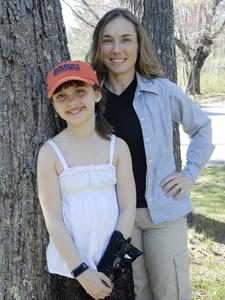Tigerlily W.
Biliary Atresia
Author: Glenn Jordan
Originally published in Portland Press Herald
Daughter’s illness inspires women’s marathon quest

Falmouth’s Crystal White is among many Boston Marathon runners who are raising money for charity.
FALMOUTH – The women’s elite field for Monday’s 114th running of the Boston Marathon includes two women from Falmouth, Sheri Piers and Mary Pardi.
When Tigerlily White of Falmouth needed a liver transplant, her mother, Crystal, donated part of her own liver. Now, Crystal is raising money for the American Liver Foundation by running the Boston Marathon.
Piers, 38, finished 11th among all women last year. Pardi, now a master at 40, hopes to break three hours for the first time and finish among the top 10 in her age group.
Another woman from Falmouth, Crystal White, will make her marathon debut at Boston. Although not an elite runner, White’s presence in Boston is one of the reasons this annual race from Hopkinton to Copley Square is more than a sporting event.
“I think you should know, Crystal is one amazing lady,” said Mimi Golub, a senior communications writer for the American Liver Foundation. “I’m in awe of what she does for Tigerlily and her other children.”
Tigerlily is the second of Crystal and Donovan White’s three children, a 9-year-old daughter born with biliary atresia, a disease of the bile ducts that affects only infants.
Two decades ago, a baby with biliary atresia rarely reached her second birthday. Tigerlily did so because of a liver transplant at 15 months old.
The donated organ came from Crystal, whose own liver grew back to 90 percent of its original size within six weeks of surgeons slicing off a portion for her daughter.
Tigerlily – named for the flowers blooming in the yard of Crystal and Donovan White when their daughter was born in July of 2000 — will speak before 500 people at a brunch this morning honoring the 250 members of the ALF’s Run For Research team, the oldest and second-largest charity group involved with the Boston Athletic Association.
“I let her speak for herself,” said Crystal, 37. “She’ll talk about what it’s like to be a kid in and out of the hospital, about taking meds every day. It’s like, ‘Look at me — I’m totally doing great with all I’ve been through.'”
Another Run for Research athlete had been matched with Tigerlily until Crystal, who played field hockey and basketball and ran track at Winthrop High before graduating in 1991, decided she wanted to do something to give back to the foundation. A year of relatively normal health for her daughter had allowed Crystal to step back from constant medical attention.
“When you have a sick kid, and she’s doing well, you’re trying to find things to keep you busy,” Crystal said. “Otherwise, all your panic buttons can get triggered. I discovered that if I run, I don’t have as much anxiety. So running became a way to focus that mom energy, or worry energy, as my kids call it.”
On a recent weekday morning, with Tigerlily, 12-year-old Zed and 6-year-old Nellie safely off to school, Crystal jogged three miles along Woodville Road, passing in front of the town’s high school and middle school. Her goal in Boston is to maintain a pace of 10 minutes per mile. Her longest previous race was the 7-mile Falmouth Road Race last summer on Cape Cod.
Training fell off, however, when Tigerlily became ill in the fall and missed a big chunk of school. The medicines required to keep her liver healthy leave her susceptible to sickness. She can’t take egg-based or live vaccinations. She’s not immune to chicken pox.
“It’s things like that,” Crystal said, “that you don’t really plan on when you go into parenthood.”
In other respects, Tigerlily is similar to a lot of kids. She loves to swim and ski and ride her bike. She dances, both tap and ballet. She helps to dispel the notion, mistakenly held by some, that liver disease holds some sort of social stigma, that it’s brought on by drinking or drug use.
“There are thousands of liver diseases that are not self-inflicted,” Crystal said. “And one in 10 kids waiting for a transplant will not make it, because one was not available.”
Which is why, when she figured in late February she simply had not put in the training necessary to complete a marathon, Crystal and her Run For Research coach, Brian Hamill, drew up a revised schedule. No matter that she had not run more than six miles for more than six weeks. April is Organ Donor Awareness Month. She would find a way.
When it came time for her 20-mile run, the most significant hurdle in her training, Donovan packed up Nellie, Tigerlily and Zed and drove to various checkpoints along Crystal’s route, cheering like crazy as she passed.
Tigerlily’s long illness – she’s been fine since breaking her wrist falling off a swing in early March – caused Crystal to cancel a couple of fund-raisers, so she’s a bit shy of the $3,500 goal she set.
Moreover, she said, become an organ donor and tell your family, your friends and your co-workers. Check that box on your driver’s license form.
“So if something were to happen to you, you could save up to six lives,” Crystal said. “That’s a good gift.”
Last updated on August 5th, 2022 at 03:18 pm